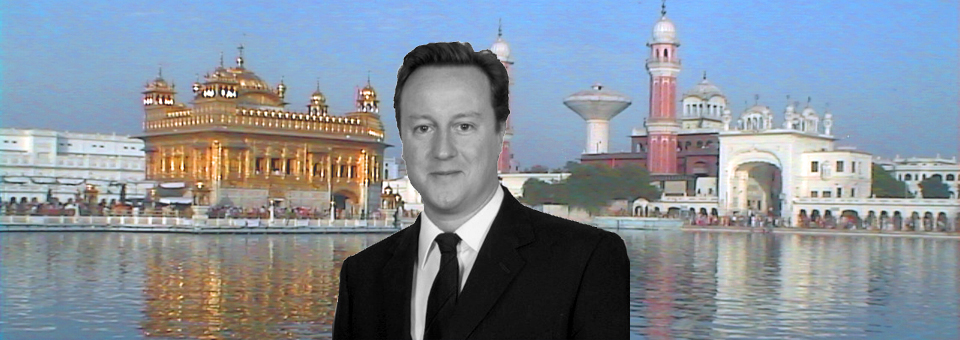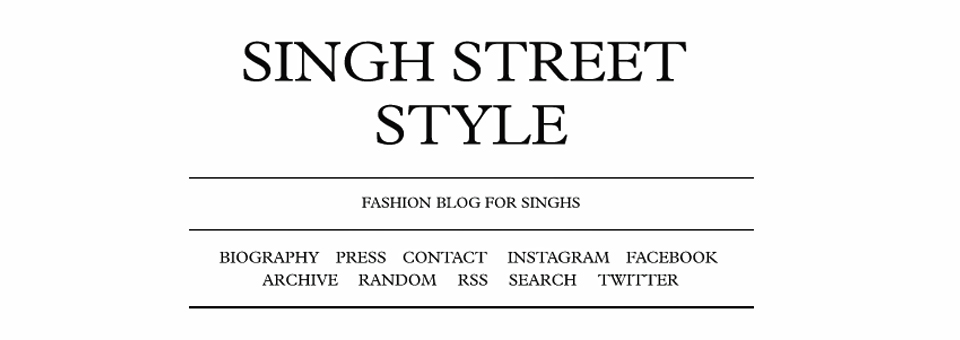British Prime Minister David Cameron embarked on a relationship-defining trip to India earlier this week, although quite how much can be defined in just 3 days is questionable. My guess is that his advisors presumed India was still in the habit of cementing such ties with just a solitary meeting of the bride and groom-to-be, followed by a day of celebration and recuperation respectively. But if that were the case, the right honourable David Cameron had been ill-advised to travel north to the Punjab where undoubtedly the most nefarious of India’s politics have been played out to a watching World for almost a hundred years now.
At first there were tweets and posts a-plenty throughout the Sikh world rejoicing the visit of Mr Cameron to the centre of Sikhdom, Amritsar. It was as if many Sikhs looked upon his visit as vindication of their own beliefs and sense of belonging to the Darbar Sahib, something which I can comprehend even if I choose to think otherwise. I would contend that Mr Cameron’s appearance at the complex says very little about how the Sikh world is viewed in the West, and says more about state affairs and political jostling. When the Mughal Emperor Akbar visited the Darbar of the third Guru Nanak, Guru Amar Das, he did so to pay obeisance to the values and principles that the Sikh way of life was espousing and stood for. He was shown no special treatment and was part of the pangat (those sharing a meal on one platform) before he could have sangat (meeting with the Guru). Such a State visit is to be lauded, quite unlike the stage-managed visits of the modern era.
However that would be an unfair comparison as there are very few statesmen and women in our times that might be so bold. The visit itself garnered fervent press interest and it was put across by some impish journalists and editors that perhaps this was a clever ploy by the Conservative party to attract Sikh voters to their cause back in the UK. This train of thought stems from the premise that if David Cameron is seen walking barefoot through the parikarma (pathway) of the Darbar Sahib complex and then stood before the Guru Granth Sahib in solemn pose with hands joined together, many of the hundreds and thousands of Sikhs in the UK might be swayed into voting for his party in the future. It’s an idea that on first glance might hold some credibility and might even point towards a collusion with advisors from the State Government of Punjab who posed so gleefully with Mr Cameron as the sun shone down in Amritsar on Wednesday – themselves no strangers to wooing voters by unorthodox means. But of course this is where that particular idea falls down. It is sad to say, but Sikhs and Punjabis in general are unlikely to be swayed by something as wholesome as empathy for their way of life (if that’s what it was); rather they pledge allegiance here in the UK, as in Punjab, to that which benefits them the most. Financially.
This is perhaps where our attention should be, on the true purpose of this trip. It’s not a secret that the cementing of relationships between India and the United Kingdom relates to the rise of the sub-continent in a global-economic sense and the increased trading possibilities that might entail. The UK is a market that India wants to tap as is like wise, India a market that the UK wants to grow in. But the trip north to Punjab would have meant so much more for the ruling Shiromani Akali Dal (Badal) political party. The legitimacy of this ruling elite in the land of the five rivers is now beyond question with Mr Badal (Chief Minister) and Mr Makkar (head of the SGPC) having smiled widely in photo opportunities with Mr Cameron. The alliances and agreements that will have been put into place by Mr Cameron and his counterparts in Delhi will have been echoed in some way, no matter how small, at this meeting of political heavyweights in the Punjab. It is nothing new; these are the ways in which nation states work and how those who pull the strings are able to continue to do so. But importantly it is the culmination of decades of manoeuvring in Punjab that now places the Shiromani Akali Dal (Badal) to a point rarely reached before by a Sikh group on an international scale. Some might see this as a good thing. Those who are imprisoned merely for standing in opposition politically, will not.
Unremarkably however, the most number of column inches have been garnered by David Cameron’s visit to the Jallianwala Bagh, just outside of the Darbar Sahib complex. It was the first time that this site was visited by a sitting-British Prime Minister to offer regret for the shooting of over a thousand protesting civilians under British rule in 1919. Some have been disappointed that Mr Cameron fell short of an outright apology. But they would do well to remember that he is a 21st century statesman who knows only too well to assimilate with the customs of the nations he visits. When the Indian state has never apologised for the planned attack on the capital of the Sikh people less than 30 years ago, how could he in all appropriateness apologise for an act committed 40 years before his birth? I found it unremarkable that this news story has caused such a fuss, but I continue to be surprised by the number of Sikhs who would fall into this trap. For decades we have held up Udham Singh as a hero for taking back some sense of the Punjab’s loss that day in 1919; how is it that we still require an official apology for this one incident when the division of the Punjab which was so recklessly undertaken in full accordance with British policy in a mere 6 month period is never even mentioned? I don’t require an apology from David Cameron, the United Kingdom or India for that matter, for anything. As a Sikh, my only goal is to try to put right that in society which is wrong and in my experience, apologies do not change the state of play, they merely cover the cracks.





